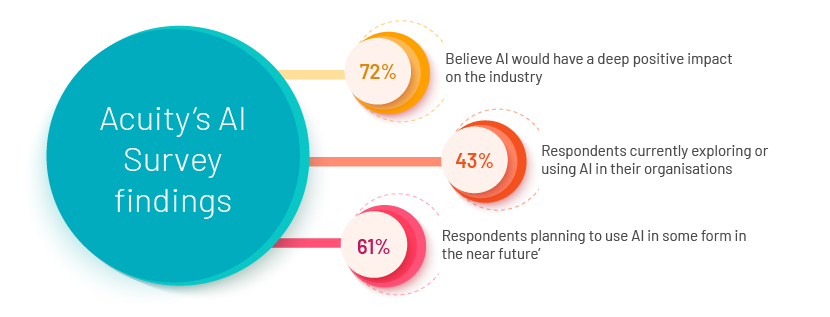Published on July 3, 2020 by Abhishek Bhatia
Artificial intelligence (AI) is a branch of computer science that pursues making computers or machines as intelligent as human beings.
It is “the science and engineering of making intelligent machines, especially intelligent computer programs”, according to the father of AI, John McCarthy. Put simply, AI in computers means they are smart enough to think.
Hollywood has been talking about AI for decades, but it has gained the most popularity in the past couple of years. We now see AI entering almost every domain – from manufacturing to financial services to healthcare. Many products and services we use today have AI, and the chances are that we use such products and services without realising it . The adoption of AI is increasing, as per a recent McKinsey Global AI Survey, and the technology is generating returns. The survey found a nearly 25% y/y increase in the use of AI in standard business processes, with a sizeable jump from the past year, as companies use AI in multiple areas of business.
With AI having reached or reaching every market and industry, market research cannot but get on board. The impact of AI on market research can be seen from the very fact that the term “artificial intelligence” is used nine times in the ESOMAR Global Market Research 2019 report. Qualtrics, a leading experience management company, surveyed 250 market research decision makers recently to ask them how much they believe AI would impact the industry. Eighty percent of the respondents believe AI will make a positive impact on the market research industry. Both older and younger researchers share this view.
AI is changing and will likely further change the dynamics of market research. It is currently influencing market research mainly by way of text analytics, advanced data analysis and machine learning.
Text analytics, put simply, is the advanced version of analysing open-ended responses to a market research survey. Text analytics analyse the sentiments of respondents on the research topic. Almost all research surveys use open-ended questions, as these provide respondents the opportunity to freely express their opinions on the brands, products or services they use. Text analytics techniques are used to capture the emotions and feelings of respondents, taking research data analysis to the next level. AI is, therefore, affecting data processing and analysis significantly because of its ability to generate insights from large amounts of data in seconds, which would otherwise have taken entire teams days or even weeks to generate. Additionally, machine learning methods are being devised to make market research efforts yield results quicker, more cost-effectively and more efficiently. Machine learning is also helping researchers to make recommendations more quickly and share detailed insights from the collected data. Some market research agencies are using AI to manage their online panels effectively and to understand the behaviour of panellists, thus engaging them more effectively to yield better responses and results.
Acuity Knowledge Partners recently surveyed 100 senior market researchers globally and asked them about the use of AI and its impact on the market research industry. Seventy-two percent of the respondents said that AI would have a deep positive impact on the industry, while 43% said that they were currently exploring or using AI in their organisations and that they expect to increase its use in the coming years. Sixty-one percent of the respondents said they plan to use AI in some form in the near future. Survey findings also showed that AI is influencing and will continue to influence market research significantly in the coming years but that many aspects still need to be explored to make traditional market research more effective. We expect more and more market research companies to join in exploring and offering other components of AI in their market research processes.

How Acuity Knowledge Partners can help
As a leading provider of high-value research, analytics and business intelligence, Acuity Knowledge Partners (Acuity) offers a full suite of market research services. We started using AI in terms of survey analytics to extract sentiment, for topic detection and to deep dive into digital conversation using social media and verbatim survey responses. We plan to make significant strides in this area and to follow a well-researched approach founded on our two decades of experience in the market research domain.
Our range of market research services include the following:

Sources:
ESOMAR Global Market Research 2019 Report
https://www.qualtrics.com/m/assets/wp-content/uploads/2018/08/AI-in-MR-Final.pdf
Tags:
What's your view?
About the Author
Abhishek is an Associate Director with Acuity Knowledge Partners (Acuity) and has over 19 years of experience in market research, consulting and data analytics. He is an expert in primary research and project management. Abhishek is an active contributor to the primary research fraternity and has been awarded as Research Hero for 2023 by the prestigious Market Research Society. Abhishek leads multiple large client engagements and is instrumental in setting up Acuity’s primary research business
Like the way we think?
Next time we post something new, we'll send it to your inbox








